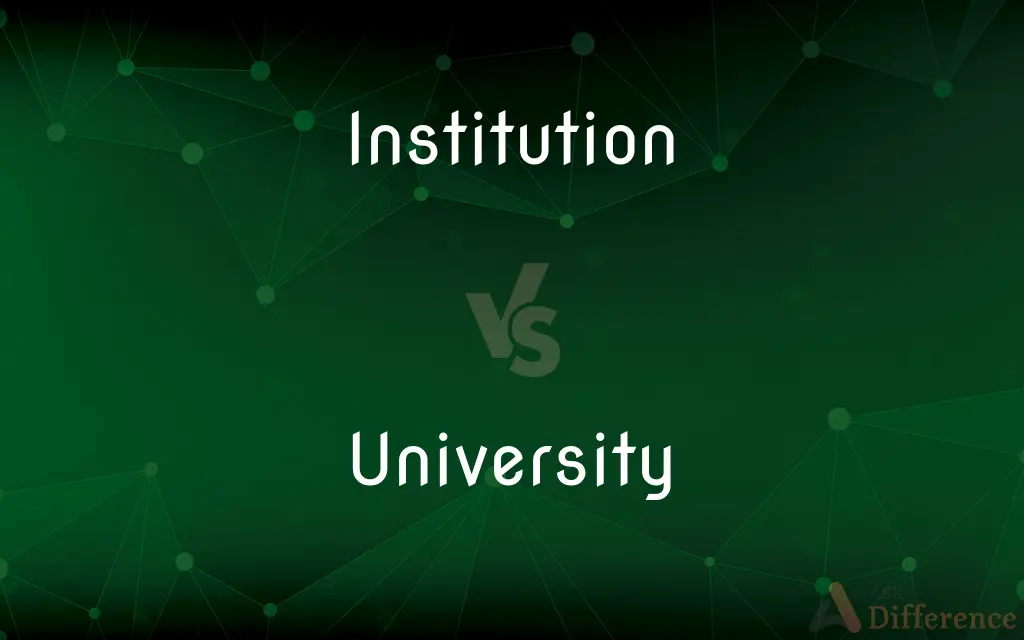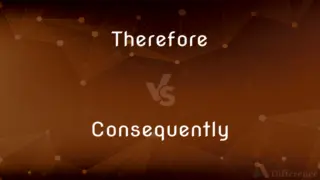Institution vs. University — What's the Difference?
Edited by Tayyaba Rehman — By Fiza Rafique — Updated on March 19, 2024
An institution is broad term for an organization founded for a specific purpose, such as educational, financial, or social, while a university is a specific type of educational institution that offers undergraduate and graduate degrees in various fields.

Difference Between Institution and University
Table of Contents
ADVERTISEMENT
Key Differences
An institution represents a wide array of organizations, including educational, financial, social, and governmental bodies, each with a distinct purpose and structure. It refers to an established entity, often recognized for its role in society, and can range from schools and hospitals to banks and legal systems. On the other hand, a university is a type of educational institution specifically designed for higher learning and research, offering degrees across various disciplines and often involved in the generation of new knowledge through research.
While institutions serve a variety of societal needs, universities focus on the academic and professional development of individuals. Universities are characterized by their offer of undergraduate and postgraduate education, faculty involved in research, and a campus that provides a community for students and staff. In contrast, the term 'institution' can apply to any organized body, including those outside the educational sphere, making it a more encompassing term.
In the context of education, institutions include not only universities but also schools, colleges, vocational training centers, and more, each catering to different educational levels and needs. Universities, however, are distinct for their comprehensive approach to education, combining teaching, research, and often community service, aiming to foster a holistic development of their students.
The governance and scope of institutions can vary widely, from private and public to global organizations, each with its own set of rules, norms, and objectives. Universities, while diverse in their structures, typically maintain a degree of academic freedom and self-governance, allowing them to set their educational and research agendas independently.
In summary, while all universities are institutions, not all institutions are universities. The term 'institution' covers a broader spectrum of organized bodies within society, whereas 'university' specifically refers to a higher education and research establishment.
ADVERTISEMENT
Comparison Chart
Definition
An organization established for a specific purpose, educational or otherwise.
A type of educational institution offering higher education and research.
Scope
Can be educational, financial, social, or governmental.
Primarily focused on higher education and research.
Offerings
Can range from services, education, financial products, to legal frameworks.
Offers undergraduate and postgraduate degrees across various fields.
Examples
Schools, hospitals, banks, courts.
Harvard University, University of Tokyo, Oxford University.
Primary Function
Depends on the type of institution (education, health, finance, etc.).
Education and research, often including community service.
Compare with Definitions
Institution
An established organization with a specific purpose.
The Red Cross is a humanitarian institution.
University
An institution of higher learning offering degrees.
She graduated from a prestigious university.
Institution
A societal or organizational structure with a defined role.
Marriage is considered a social institution.
University
A place for research and advancement of knowledge.
The university is known for its cutting-edge research.
Institution
A foundational system or framework within society.
The legal system is a critical institution for justice.
University
A community of scholars, students, and staff.
The university campus is a vibrant community.
Institution
A facility providing a particular service.
The local hospital is an important health institution.
University
An establishment that grants academic degrees.
He received his PhD from the university.
Institution
An organization dedicated to education or care.
The state school is an educational institution.
University
An institution comprising various colleges and departments.
The university houses faculties ranging from arts to sciences.
Institution
Institutions, according to Samuel P. Huntington, are "stable, valued, recurring patterns of behavior". Institutions can refer to mechanisms which govern the behavior of a set of individuals within a given community, and are identified with a social purpose, transcending individuals and intentions by mediating the rules that govern living behavior.
University
A university (Latin: universitas, 'a whole') is an institution of higher (or tertiary) education and research which awards academic degrees in several academic disciplines. Universities typically offer both undergraduate and postgraduate programs.
Institution
The act of instituting
The institution of reforms.
University
An institution for higher learning with teaching and research facilities typically including a graduate school and professional schools that award master's degrees and doctorates and an undergraduate division that awards bachelor's degrees.
Institution
A custom, practice, relationship, or behavioral pattern of importance in the life of a community or society
The institutions of marriage and the family.
University
The buildings and grounds of such an institution.
Institution
(Informal) One long associated with a specified place, position, or function.
University
The body of students and faculty of such an institution.
Institution
An established organization or foundation, especially one dedicated to education, public service, or culture.
University
Institution of higher education (typically accepting students from the age of about 17 or 18, depending on country, but in some exceptional cases able to take younger students) where subjects are studied and researched in depth and degrees are offered.
The only reason why I haven't gone to university is because I can't afford it.
Institution
A building or complex of buildings housing such an organization.
University
The universe; the whole.
Institution
A building or complex of buildings housing people who need special services, such as orphans or people with mental disabilities.
University
An association, society, guild, or corporation, esp. one capable of having and acquiring property.
The universities, or corporate bodies, at Rome were very numerous. There were corporations of bakers, farmers of the revenue, scribes, and others.
Institution
A custom or practice of a society or community.
The institution of marriage is present in many cultures but its details vary widely across them.
University
An institution organized and incorporated for the purpose of imparting instruction, examining students, and otherwise promoting education in the higher branches of literature, science, art, etc., empowered to confer degrees in the several arts and faculties, as in theology, law, medicine, music, etc. A university may exist without having any college connected with it, or it may consist of but one college, or it may comprise an assemblage of colleges established in any place, with professors for instructing students in the sciences and other branches of learning. In modern usage, a university is expected to have both an undergraduate division, granting bachelor's degrees, and a graduate division, granting master's or doctoral degrees, but there are some exceptions. In addition, a modern university typically also supports research by its faculty
The present universities of Europe were, originally, the greater part of them, ecclesiastical corporations, instituted for the education of churchmen . . . What was taught in the greater part of those universities was suitable to the end of their institutions, either theology or something that was merely preparatory to theology.
Institution
A long established and respected organization, particularly one involved with education, public service, or charity work.
The University of the South Pacific is the only internationally accredited institution of higher education in Oceania.
University
The body of faculty and students at a university
Institution
The building or buildings which house such an organization.
He's been in an institution since the crash.
University
Establishment where a seat of higher learning is housed, including administrative and living quarters as well as facilities for research and teaching
Institution
A mental institution.
University
A large and diverse institution of higher learning created to educate for life and for a profession and to grant degrees
Institution
(informal) Any long established and respected place or business.
Over time, the local pub has become something of an institution.
Institution
(informal) A person long established in a place, position, or field.
She's not just any old scholar; she is an institution.
Institution
The act of instituting something.
The institution of higher speed limits was a popular move but increased the severity of crashes.
Institution
(Christianity) The act by which a bishop commits a cure of souls to a priest. en
Institution
(obsolete) That which institutes or instructs, particularly a textbook or system of elements or rules.
Institution
The act or process of instituting; as: (a) Establishment; foundation; enactment; as, the institution of a school.
The institution of God's law is described as being established by solemn injunction.
Institution
Instruction; education.
Institution
That which instituted or established
The nature of our people,Our city's institutions.
Institution
An established or organized society or corporation; an establishment, especially of a public character, or affecting a community; a foundation; as, a literary institution; a charitable institution; also, a building or the buildings occupied or used by such organization; as, the Smithsonian Institution.
We ordered a lunch (the most delightful of English institutions, next to dinner) to be ready against our return.
Institution
That which institutes or instructs; a textbook; a system of elements or rules; an institute.
There is another manuscript, of above three hundred years old, . . . being an institution of physic.
Institution
An organization founded and united for a specific purpose
Institution
An establishment consisting of a building or complex of buildings where an organization for the promotion of some cause is situated
Institution
A custom that for a long time has been an important feature of some group or society;
The institution of marriage
The institution of slavery
He had become an institution in the theater
Institution
A hospital for mentally incompetent or unbalanced person
Common Curiosities
Are all universities considered institutions?
Yes, universities are a specific type of educational institution.
What differentiates a college from a university?
Colleges typically focus on undergraduate education, whereas universities offer both undergraduate and graduate degrees and are involved in research.
Can institutions exist outside the educational sector?
Yes, institutions can exist in various sectors, including finance, health, social services, and government.
Is a university always a part of the public sector?
Universities can be both public and private, depending on their funding and governance.
Can any educational institution be called a university?
No, only institutions that offer higher education degrees and are involved in research can be called universities.
How do institutions evolve over time?
Institutions evolve in response to societal changes, technological advancements, and shifts in cultural and economic landscapes.
Do universities have to be accredited?
Yes, universities typically need to be accredited by relevant authorities to ensure their degrees are recognized.
How do universities contribute to society apart from education?
Universities contribute through research, community service, and by fostering innovation and cultural development.
Can an institution become a university?
An educational institution can become a university if it meets the criteria for higher education and research offerings.
What roles do institutions play in a society?
Institutions help structure society, providing services, governance, education, and frameworks for social interaction.
Are universities autonomous?
Universities often enjoy a degree of academic freedom and self-governance, allowing them to set their educational and research agendas.
What is the significance of an institution in an individual's life?
Institutions play key roles in various aspects of life, from education and health to financial stability and social services.
Can an online platform be considered a university?
Online platforms can be considered universities if they offer accredited higher education degrees and involve research activities.
What impact do universities have on local economies?
Universities can significantly impact local economies through employment, research innovations, and by attracting students and visitors.
How do cultural institutions differ from universities?
Cultural institutions, like museums and libraries, focus on preserving and disseminating culture, unlike universities, which focus on education and research.
Share Your Discovery

Previous Comparison
Therefore vs. Consequently
Next Comparison
Envelope vs. SuperscribeAuthor Spotlight
Written by
Fiza RafiqueFiza Rafique is a skilled content writer at AskDifference.com, where she meticulously refines and enhances written pieces. Drawing from her vast editorial expertise, Fiza ensures clarity, accuracy, and precision in every article. Passionate about language, she continually seeks to elevate the quality of content for readers worldwide.
Edited by
Tayyaba RehmanTayyaba Rehman is a distinguished writer, currently serving as a primary contributor to askdifference.com. As a researcher in semantics and etymology, Tayyaba's passion for the complexity of languages and their distinctions has found a perfect home on the platform. Tayyaba delves into the intricacies of language, distinguishing between commonly confused words and phrases, thereby providing clarity for readers worldwide.














































